Liam has been the No. 1 most popular boy’s name in the U.S. every year since 2017.
Boy names that start with E are making a comeback — and we’re totally here for it!
According to Behind the Name, the letter “e” was a top-five first initial for boys in the United States in the early 1900s, when names like Edward, Earl, Ernest, Eugene and Elmer were sweeping the nation.
But something happened in the mid-1900s that saw boy names starting with E collapse.
RELATED: 60+ Nature Inspired Boy Names for Your Future Son
The letter “e” fell out of the top-10 in the 1940s and fell as far back as 15th in the 1950s before finally returning to the top-10 in 2000, where it has remained ever since.
It has now been the sixth-most popular first initial for boys every year since 2015, per Behind the Name.
Thanks to data by the U.S. Social Security Administration (SSA), we can see just how much boy names that start with E have changed over the past 100 years — and you’d be surprised at the difference.
| Most popular boy names with E in the 1910s | Most popular boy names with E in 2024 |
| 8. Edward | 8. Elijah |
| 33. Earl | 13. Ezra |
| 35. Ernest | 19. Ethan |
| 39. Eugene | 25. Elias |
| 45. Elmer | 54. Ezekiel |
| 53. Edwin | 74. Enzo |
| 87. Edgar | 85. Everett |
| 93. Everett | 92. Eli |
Edward, Earl, Ernest, Eugene and Elmer all cracked the SSA’s list of the top-50 most popular boy names of the 1910s, when the letter “e” was a top-five first initial in the U.S.
But fast forward to 2024 and most of those names aren’t even found in the top 1,000.
According to the SSA, Elijah, Ezra, Ethan and Elias were all top-25 boy names in the U.S. in 2024 — with Ezekiel, Enzo, Everett and Eli also landing in the top-100.
If you’re looking to add a few boy names that start with E to your list, then you’ve come to the right place!
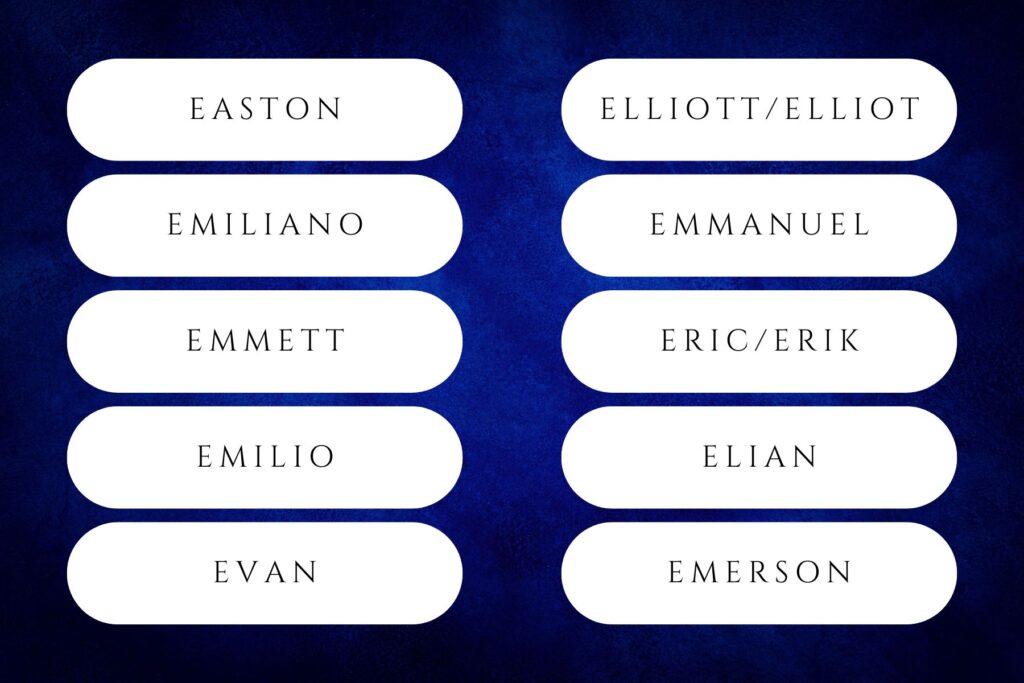
Easton
Origin: Old English
Meaning: Eastern town
Easton, pronounced EE-stun or EE-stin, comes from the Old English words east, referring to the cardinal direction, and tun, meaning “town.” It originated as a surname given to someone who lived in the east.
Emiliano
Origin: Spanish; Italian; Latin; Roman
Meaning: Rival
Emiliano, pronounced eh-mee-lee-AH-noh, is the Spanish, Italian and Portuguese form of Aemilius, which comes from the Latin word aemulus, meaning “rival.” Other variants include Emilian, Emilio and Emil.
Emmett
Origin: English; Germanic; Hebrew
Meaning: Whole; Great; Truth
Emmett, pronounced EH-mit, originated as a surname derived from the given name Emma, which comes from the Germanic element irmin, meaning “whole” or “great.” It can also translate to “truth” in Hebrew.
Emilio
Origin: Italian; Spanish; Roman; Latin
Meaning: Rival
Emilio, pronounced eh-MEE-lee-oh, is the Italian and Spanish form of the Roman family name Aemilius, which derives from the Latin word aemulus, meaning “rival.” The English form of this name is Emily.
Evan
Origin: English; Welsh; Hebrew
Meaning: God is gracious
Evan, pronounced EH-vin, is the Anglicized form of Ifan, the Welsh form of John, which ultimately derives from the Hebrew name Yohanan and is composed of the Hebrew elements yo, meaning “God,” and hanan, meaning “gracioius.”
Elliot/Elliott
Origin: English; Hebrew
Meaning: My God is Yahweh
Elliott, pronounced EL-ee-it, originated as an English surname derived from the medieval name Elias, which comes from the name Elijah and is composed of the Hebrew elements el and yah, both of which mean “God.”
Emmanuel
Origin: Hebrew
Meaning: I’m with God; God is with us
Emmanuel, pronounced ee-MAN-yoo-el or EE-man-yoo-uhl, comes from the Hebrew name ʿImmanuʾel, which is composed of the Hebrew elements im, meaning “with,” and el, referring to the Hebrew God.
Eric/Erik
Origin: English; Old Norse
Meaning: Forever King; Long live the King
Eric and Erik, pronounced AIR-ik, is the Anglicized form of the Old Norse name Eiríkr, which is composed of the Old Norse elements ei, meaning “ever” or “always,” and ríkr, meaning “ruler” or referring to a “king.”
Elian
Origin: Dutch; Hebrew
Meaning: My God is Yahweh; Oath to God
Elian, pronounced el-ee-AHN, is a Dutch variant of names that start with Eli-, such as Elias and Elijah (both of which mean “my God is Yahweh” in Hebrew) and Elisabeth, meaning “oath to God” in Hebrew.
Emerson
Origin: English; French; Germanic
Meaning: Son of Emery
Emerson, pronounced EH-mer-sun, is a patronymic name meaning “son of Emery,” with Emery beinga form of Emmerich, which is composed of the Germanic elements irmin, meaning “great,” and rih, meaning “ruler.”
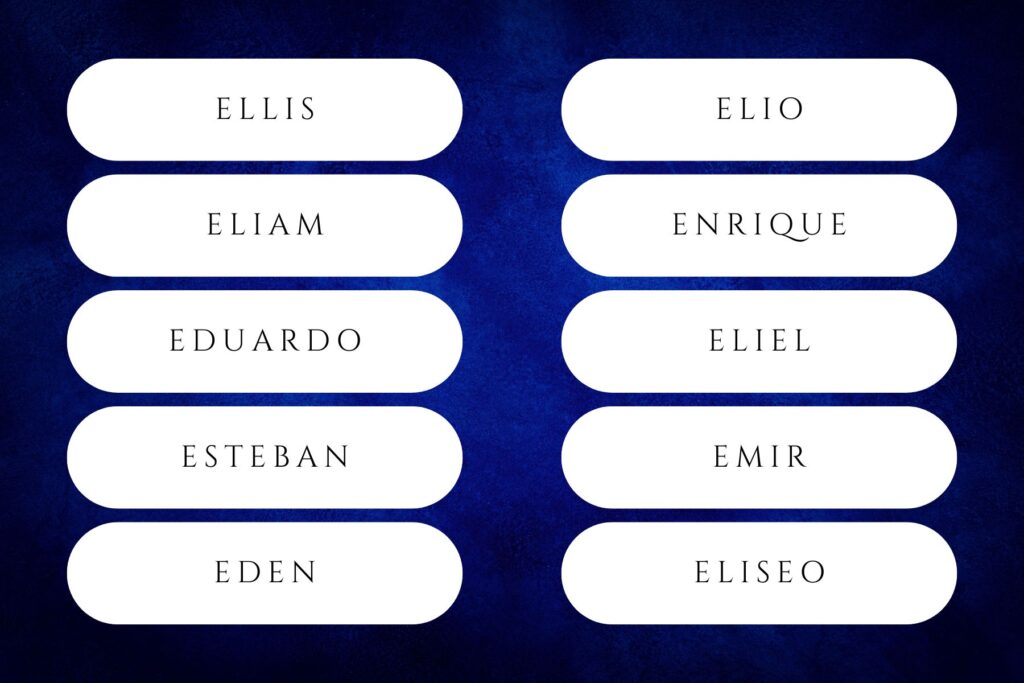
Ellis
Origin: English; Hebrew; Welsh
Meaning: My God is Yahweh; Kind; Benevolent
Ellis, pronounced EL-iss, originated as a surname derived from Elias and Elijah, meaning “my God is Yahweh” in Hebrew. It can also come from the Welsh name Elisedd, meaning “kind” or “benevolent.”
Eliam
Origin: Hebrew
Meaning: God is my people, God’s people
Eliam, pronounced eh-LEE-um or el-ee-AHM, is composed of the Hebrew elements el, referring to the Hebrew God, and am, meaning “people.” In the Bible, Eliam was a member of David's supreme military council and commanders.
Eduardo
Origin: Spanish; Portuguese; Old English
Meaning: Protector of wealth; Fortunate protection
Eduardo, pronounced ed-WAR-doh or eh-doo-AHR-doh, is the Spanish and Portuguese form of Edward, which derives from the Old English elements ead, meaning “wealth,” and weard, meaning “guard.”
Esteban
Origin: Spanish; Greek
Meaning: Crown; Wreath; That which surrounds
Esteban, pronounced ES-tih-bahn, is the Spanish form of Stephen, which comes from the Greek name Stephanos, meaning “that which surrounds.” It traditionally refers to a crown or wreath worn on the head.
Eden
Origin: Biblical; Hebrew
Meaning: Pleasure; Delight; Garden of Eden
Eden, pronounced EE-din, comes directly from a place name in the Bible believed to derive from the Hebrew word eden, meaning “pleasure” or “delight.” The Garden of Eden is where Adam and Eve lived.
Elio
Origin: Italian; Spanish; Greek
Meaning: Sun; Sun god
Elio, pronounced EL-ee-oh or EE-lee-oh, is the Italian and Spanish form of Aelius, which comes from a Roman family name believed to derive from the Greek word helios, meaning “sun.” In Greek mythology, Helios is the personification of the sun.
Enrique
Origin: Spanish; Germanic
Meaning: Home ruler; Ruler of the home
Enrique, pronounced en-REE-kay, is the Spanish form of Henry, which comes from the Germanic name Heimirich and is composed of the Germanic elements heim, meaning “home,” and rih, meaning “ruler.”
Eliel
Origin: Hebrew
Meaning: God is Yahweh
Eliel, pronounced EL-ee-el or EH-leel, is composed of the Hebrew elements el and el, both of which refer to the Hebrew God. Several characters in the Old Testament are given this name, including a descendant of Judah.
Emir
Origin: Turkish; Arabic
Meaning: Commander; Prince
Emir, pronounced EH-meer, is the Turkish form and Bosnian variant of Amir, which comes from the Arabic word amir, meaning “commander” or “prince.” It was originally used as a title in the Middle East.
Eliseo
Origin: Italian; Spanish; Hebrew
Meaning: God is salvation; Saved by God; God delivered
Eliseo, pronounced el-ee-SAY-oh, is the Italian and Spanish form of Elisha, which comes from the Hebrew name Elishua and is composed of the Hebrew elements el, meaning “God,” and yasha, meaning “to save.”
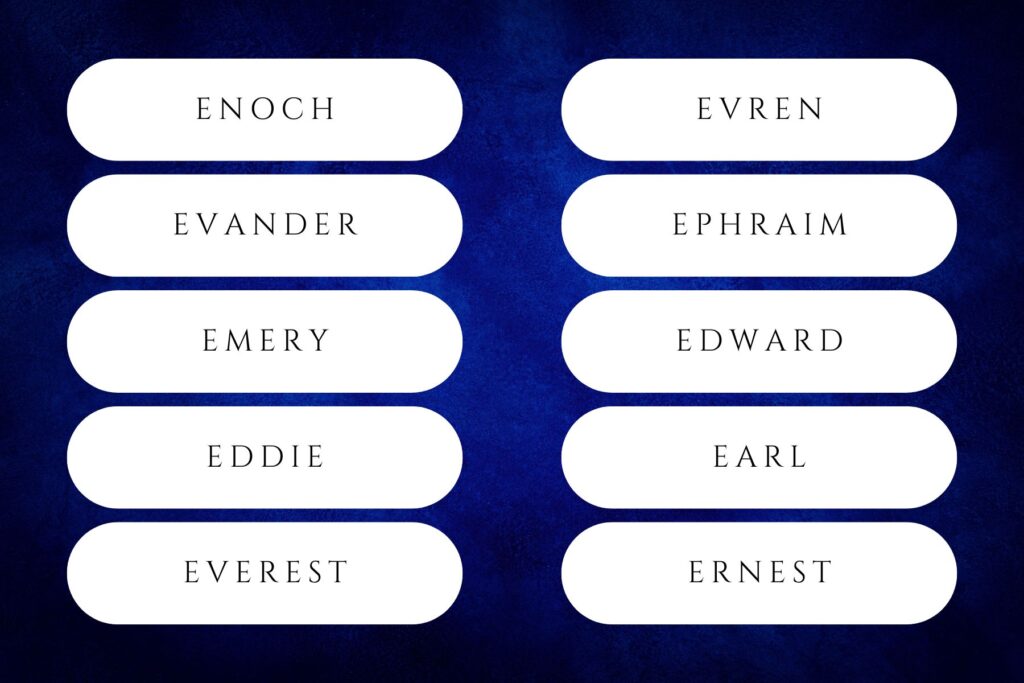
Enoch
Origin: Hebrew
Meaning: Dedicated
Enoch, pronounced EE-nawk or EE-nuhk, comes from the Hebrew name Ḥanoḵ, meaning “dedicated.” In the Old Testament, this is the name of the son of Cain, the son of Jared and the father of Methuselah.
Evander
Origin: Greek
Meaning: Good man; Man of good
Evander, pronounced ee-VAN-der, comes from the Greek name Euandros and is composed of the Greek elements eu, meaning “good,” and aner, meaning “man.” In Greek mythology, Evander was an Arcadian hero of the Trojan War.
Emery
Origin: Norman French; Germanic
Meaning: Great ruler; Great king
Emery, pronounced EH-mur-ee, is the Norman French form of Emmerich, which is believed to be composed of the Germanic elements irmin, meaning “whole” or “great,” and rih, meaning “ruler” or “king.”
Eddie
Origin: English; Old English
Meaning: Wealthy guardian; Protector of wealth; Wealthy spear
Eddie, pronounced ED-ee, is a diminutive of names that start with Ed-, like Edward, meaning “guardian of wealth” in Old English, Edmund, meaning “protector of wealth,” and Edgar, meaning “wealthy spear.”
Everest
Origin: English
Meaning: From Évreux; World’s highest mountain
Everest, pronounced EH-ver-ist, originated as a surname given to someone from Évreux in Normandy, but is more commonly associated with Mount Everest, the world’s highest mountain located in Asia.
Evren
Origin: Turkish
Meaning: Cosmos; Universe; Dragon
Evren, pronounced EHV-rin or EHV-ren, comes directly from the Turkish word evren, meaning “cosmos” or “universe.” In Turkish mythology, the Evren is a gigantic snake-like dragon that created the universe.
Ephraim
Origin: Hebrew
Meaning: Fruitful
Ephraim, pronounced EFF-rum or eff-RAH-yim, comes from the Hebrew name ʾEfrayim, which means “fruitful” in Hebrew. In the Old Testament, Ephraim is a son of Joseph and Asenath and founder of one of the twelve tribes of Israel.
Edward
Origin: Old English
Meaning: Rich guard; Guardian of wealth; Fortunate guard
Edward, pronounced ED-wird, is composed of the Old English elements ead, meaning “fortune” or “wealth,” and weard, meaning “guard.” Some common nicknames include Ed, Edd, Eddie and Eddy.
Earl
Origin: Old English
Meaning: Nobleman; Warrior
Earl, pronounced URL, comes from the aristocratic title that derives from the Old English word eorl, meaning “nobleman” or “warrior.” Other variants include Erle, Earle, Earleen, Earline and Earlene.
Ernest
Origin: Old High German
Meaning: Serious; Earnest; Intense conviction
Ernest, pronounced UR-nist, comes from the Old High German word ernust, meaning “serious” or “earnest.” In English, earnest refers to “a serious and intent mental state” or “intense conviction.”
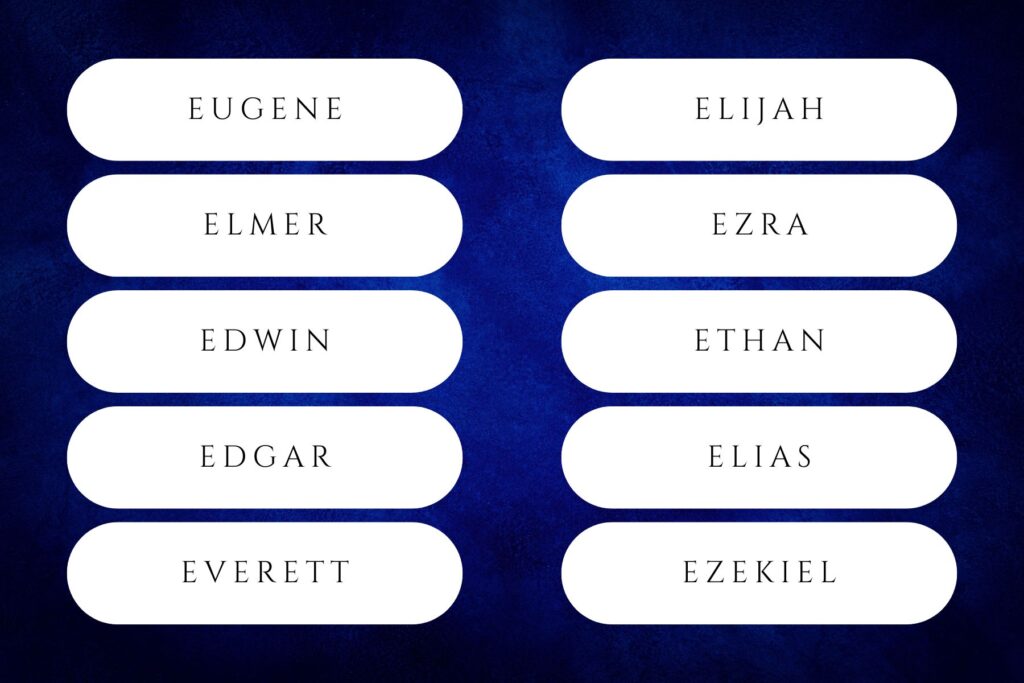
Eugene
Origin: English; Latin; Greek
Meaning: Well born; Born of goodness
Eugene, pronounced yoo-JEEN, is the English form of Eugenius, which comes from the Greek name Eugenios and is composed of the Greek elements eu, meaning “good,” and genes, meaning “born.”
Elmer
Origin: Old English
Meaning: Noble; Famous; Elm tree
Elmer, pronounced EL-mer, derives primarily from the Old English words æðel, meaning “noble,” and mær, meaning “famous,” though some parents like to associate it with elm trees due to the first syllable.
Edwin
Origin: Old English
Meaning: Wealthy friend; Fortunate friend
Edwin, pronounced ED-win, is composed of the Old English elements ead, meaning “wealth” or “fortune,” and wine, meaning “friend.” This is the first name of astronaut Edwin Aldrin, also known as Buzz Aldrin.
Edgar
Origin: Old English
Meaning: Wealthy spear; Fortunate spear
Edgar, pronounced ED-ger, is composed of the Old English elements ead, meaning “fortune” or “wealth,” and gar, meaning “spear.” It was popularized by English king Edgar the Peaceful and Edgar Allen Poe.
Everett
Origin: Old German
Meaning: As brave as a wild boar
Everett, pronounced EV-er-it, originated as a surname derived from the given names Everard and Eberhard, which is composed of the Old German elements ebur, meaning “wild boar,” and hart, meaning “hardy” or “brave.”
Elijah
Origin: Hebrew
Meaning: God is my Yahweh
Elijah, pronounced ee-LYE-juh or ee-LYE-shuh, comes from the Hebrew name ʾEliyyahu and is composed of the Hebrew elements el and yah, both of which refer to God. In the Bible, Elijah was a prophet who performed miracles and was taken to heaven in a chariot of fire.
Ezra
Origin: Hebrew
Meaning: Help; Aid
Ezra, pronounced EZ-ruh, comes directly from the Hebrew word ezra, meaning “help.” In the Bible, Ezra was a scribe and priest who led the Israelites back from Babylonian exile to restore Jewish law.
Ethan
Origin: Hebrew
Meaning: Solid; Firm; Enduring
Ethan, pronounced EE-thin, derives from the Hebrew name ʾEṯan, which means “solid” or “firm” in Hebrew. In the Bible, Ethan the Ezrahite was known for his wisdom and as the author of Psalm 89.
Elias
Origin: Greek; Hebrew
Meaning: My God is Yahweh
Elias, pronounced ih-LIE-us or eh-LEE-us, is the Greek form of Elijah, which comes from the Hebrew name ʾEliyyahu and is composed of the Hebrew elements el and yah, both of which refer to the Hebrew God.
Ezekiel
Origin: Hebrew
Meaning: God will strengthen; Strength of God
Ezekiel, pronounced eh-ZEE-kee-uhl or ih-ZEE-keel, comes from the Hebrew name Yeḥezqel, which is composed of the Hebrew elements hazaq, meaning “to strengthen,” and el, referring to the Hebrew God.
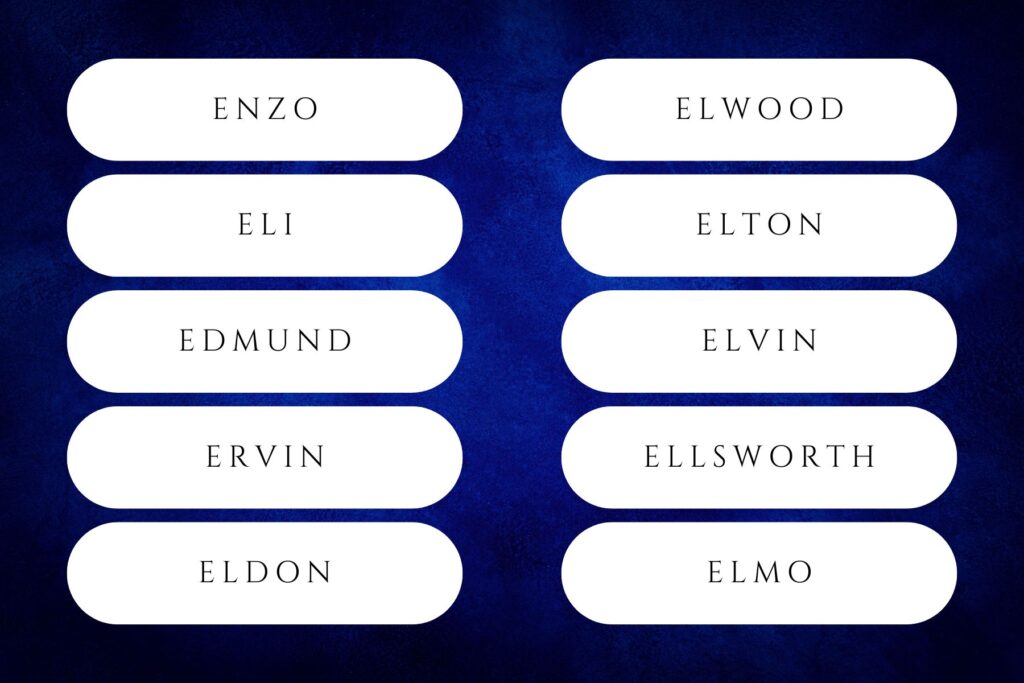
Enzo
Origin: Italian
Meaning: Varies
Enzo, pronounced EN-zoh, is believed to be a shortened form of names ending in -enzo, like Vincenzo (Italian form of Vincent), Lorenzo (Italian form of Laurence) and Florenzo (Italian form of Florence).
Eli
Origin: Hebrew
Meaning: My God is Yahweh; My God; Ascended
Eli, pronounced EE-lye, can be a shortened form of Elijah, meaning “my God is Yahweh,” but it’s also often linked to the Hebrew word ala, meaning “to ascend,” and the elements el and i, meaning “my God”
Edmund
Origin: Old English
Meaning: Protector of wealth; Fortunate protector
Edmund, pronounced ED-mund or ED-mind, is composed of the Old English elements ead, meaning “wealth” or “fortune,” and mund, meaning “protection.” Common nicknames include Ed, Eddie and Eddy.
Ervin
Origin: Old German
Meaning: Friend of the army
Ervin, pronounced ER-vin, is the Hungarian, Albanian, Croatian and Estonian form of Erwin Hariwini, which is composed of the Old German elements heri, meaning “army,” and wini, meaning “friend.”
Eldon
Origin: Old English; Hebrew
Meaning: Ella’s hill; God is my lord
Eldon, pronounced EL-din, is believed to mean Ella’s hill in Old English, but can also be a combination of the Hebrew element el, referring to the Hebrew God, and adon, a title often meaning “lord” or “master.”
Elwood
Origin: Old English
Meaning: Elder tree forest; Old forest
Elwood, pronounced EL-wood, combines either the Old English ellen, meaning “elder tree,” or eald, meaning “old,” with wudu, meaning “wood,” creating a name that means "elder tree forest" or "old forest."
Elton
Origin: Old English
Meaning: Ella’s town; Elmer’s town; Elwood’s town
Elton, pronounced EL-tin, is believed to be a combination of Old English tun, meaning “settlement” or “town,” and names that start with El-, such as Ella, Elmer and Elwood. It was popularized by singer Elton John.
Elvin
Origin: Old English
Meaning: Elf friend
Elvin, pronounced EL-vin, is a common variant of Alvin (modern English) and Ælfwine (Old English), which is composed of the Old English elements ælf, meaning “elf,” and wine, meaning “friend.”
Ellsworth
Origin: Old English
Meaning: Old enclosure; Elf enclosure
Ellsworth, pronounced ELS-werth, originated as a surname derived from a place name given to someone who lived in the town of Elsworth in Cambridgeshire. Ellsworth is believed to mean “old enclosure.”
Elmo
Origin: German
Meaning: Protected; Protective
Elmo, pronounced EL-moh, originated as a shortened form of names ending in -elmo, like Guglielmo or Anselmo. It’s believed to derive from the German element helm, meaning “helmet” or “protection.”
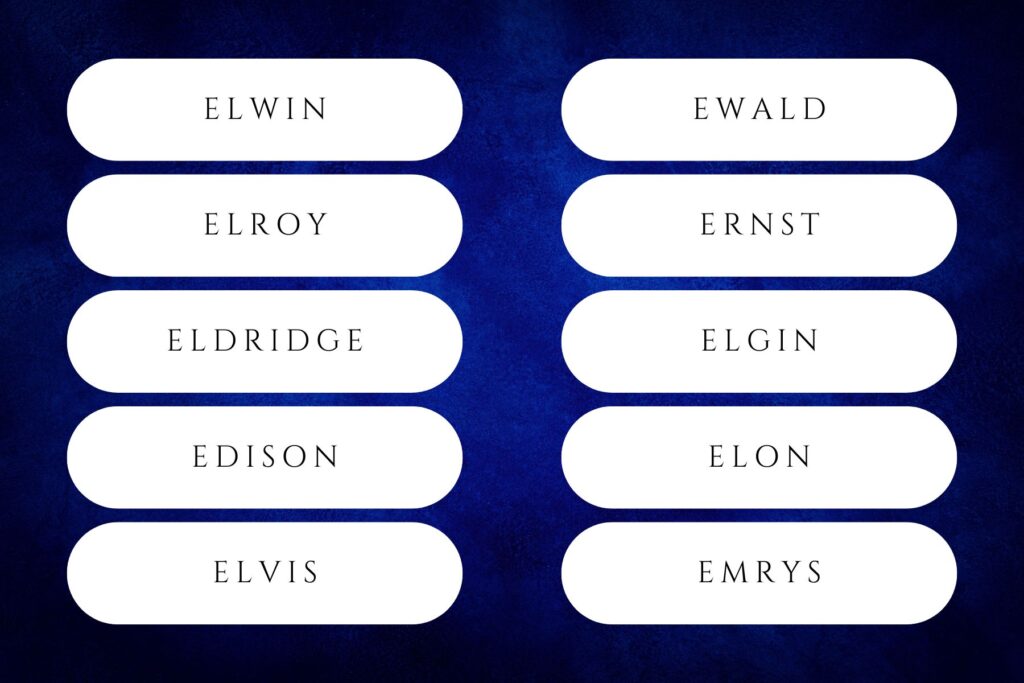
Elwin
Origin: Old English
Meaning: Elf friend
Elwin, pronounced EL-win, is another common variant of Alvin (modern English) and Ælfwine (Old English), which is composed of the Old English elements ælf, meaning “elf,” and wine, meaning “friend.”
Elroy
Origin: French; Spanish
Meaning: The king
Elroy, pronounced EL-roy, is an altered form of Leroy, which derives from the Old French phrase le roi, meaning “the king.” The name Elroy essentially replaces the French word le with the Spanish word el.
Eldridge
Origin: Old English
Meaning: Elf ruler; Noble ruler; Noble king
Eldridge, pronounced EL-drij, originated as a surname derived from the given name Eldric, which is believed to be a variant of Ælfric, meaning “elf ruler,” and Æðelric, meaning “noble ruler” in Old English.
Edison
Origin: English
Meaning: Son of Edward; Son of Edith
Edison, pronounced EH-duh-sin or EH-dih-sun, is a patronymic name meaning “son of Edward,” with Edward meaning “rich guard” in Old English, or “son of Edith,” with Edith meaning “prosperous in war.”
Elvis
Origin: Old Norse
Meaning: All-wise
Elvis, pronounced EL-vis, is believed to be a variant of Alvis, which means “all-wise” in Old Norse. In Norse mythology, Alvis was a dwarf who was to marry Thor's daughter Thrud, but Thor didn’t approve.
Ewald
Origin: Old German
Meaning: Ruler of the law; Powerful law; Law and authority
Ewald, pronounced EE-vald or AY-valt, comes from an Old German name composed of the elements ewa, meaning “law” or “custom,” and walt, meaning “power” or “authority.” It can also be spelled Evald.
Ernst
Origin: Old German
Meaning: Serious; Intense conviction
Ernst, pronounced URNST, is the German, Dutch and Scandinavian form of Ernest, which comes from the Old High German word ernust, referring to “a serious and intent mental state” or “intense conviction.”
Elgin
Origin: Old English
Meaning: Intelligent; High-minded
Elgin, pronounced EL-gin or EL-jin, is believed to derive from an Old English word meaning “intelligent” or “high-minded.” It was largely popularized in the United States by legendary NBA player Elgin Baylor.
Elon
Origin: Hebrew
Meaning: Oak tree
Elon, pronounced EE-lahn, comes directly from the Hebrew word for "oak tree,” which are known for their long lifespans and strong and durable wood. In the Bible, Elon was a judge of Israel from the Tribe of Zebulun.
Emrys
Origin: Welsh; Greek
Meaning: Immortal
Emrys, pronounced EM-riss, is the Welsh form of Ambrose, derived from the Greek name Ambrosios, meaning “immortal.” Other common variants include Ambrose (English) and Ambrogio (Italian).
Errol
Origin: Scottish
Meaning: Wanderer; Boar wolf
Errol, pronounced AIR-uhl, originated as a Scottish surname derived from the place name of a village in Perthshire. This is the name of a popular boxer, Errol Spence Jr., and the father of Elon Musk, Errol Musk.
Not Impressed By Boy Names That Start With E?

Boy names that start with E are having a moment, but not all parents are on board with the trend.
That’s okay — there are 25 other letters of the alphabet and millions of other baby names to explore!
According to Behind the Name, the top-five first initials for boys since 2020 are J, A, L and M, which is why it’s no surprise to see names like Liam, James, Mateo and Lucas all rank in the top-10 in 2024.
Noah, Oliver, Theodore, Henry, Elijah and William rounded out the top-10 for boys last year.
Other trends that seem to be popular in the U.S. today include boy names starting with Cal, such as Caleb, Calvin and Callum, and unique word names like Truce, Ryatt, Chozen and Rowdy.
In other words, there’s an endless supply of baby names — and Mod Moms Club is here to help!
ALSO ON MOD MOMS CLUB: These banned baby names and wild baby-naming laws will leave you speechless!
Aside from our baby name lists, which are published weekly, Mod Moms Club’s readers have access to our baby name generator, which allows you to narrow a list down based on your personal preference.












